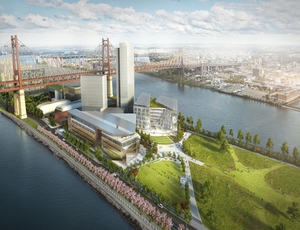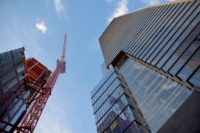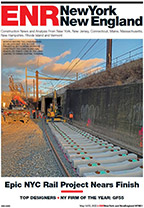Further details were released in the last week on three separate but major NYC projects—Hudson Yards; 3 Hudson Blvd.; and the Cornell Tech campus on Roosevelt Island.


The biggest in contract value of these comes from Tutor Perini Corp., whose Civil Group was awarded the $510-million contract to build the platform structure at the Hudson Yards development site on Manhattan's west side. The Dec. 12 announcement follows ground breaking of the second tower, 30 Hudons Yards, at the 26-acre site on Dec. 4.
Pre-construction activities on the platform began in mid-2013. Work related to the platform has already begun and is expected to be completed in 2016.
The structural steel frame platform will feature a reinforced concrete deck and will bridge the active Long Island Rail Road in the Eastern Rail Yards portion of the site. Construction will be coordinated with work already under way on the Amtrak concrete tunnel box, the Gateway right-of-way preservation project at the same site, Tutor Perini said in a Dec. 12 statement.
By this time next year, the entire Eastern Rail Yards portion of the site will be under construction, including four towers, a retail podium and a public plaza, says a spokeswoman at Related Cos., which is co-developing the site with Oxford Properties.
Another project, located on 11th Avenue between West 34th and 35th streets near Hudson Yards, is Moinian Group's planned 3 Hudson Blvd., a 1.8-million-sq-ft, mixed-use tower. A spokeswoman for the developer, which released new renderings of the project on Dec. 17, says this will be a high-performance, sustainable building and that design plans are progressing on the interiors and the rest of the tower, which is expected to cost from $800 million to $900 million to build. Tishman Construction is the lead construction partner, and Dan Kaplan of FXFOWLE designed the building, she says.
The building includes 48,000-sq-ft floor plates on the podium level, 30,000- to 35,000-square-foot, column-free floor plates in the tower office floors, with 11-foot-high ceilings and with floor-to-ceiling windows.
Earlier today, Dec. 19, the city announced that it transferred 12 acres of Roosevelt Island to Cornell NYC Tech and formally executed a 99-year lease with what is hoped to become one of the country's leading applied sciences schools. Cornell Tech's entire $2-billion-plus planned development on the island is set for a 2043 completion, the city says.
The news comes on the heels of Cornell Tech's Dec. 16 announcement that Hudson Cos. and Related Cos. have formed a joint venture to build the first residential building for the Roosevelt Island campus. The project is set to begin in 2015 with completion set for 2017 when the first phase of the entire development is targeted for completion.
Designed by Handel Architects, the latest building on the campus will be a passive sustainable structure that will include 250 housing units for students, staff and faculty; a gym; bike room; lounge; roof deck; and multi-purpose, collaboration, and media rooms. This is the latest project for the Hudson-Related jv, which has been working together on Roosevelt Island for 16 years.
“Cornell Tech is centered around innovation, and this building will break new ground with its approach to sustainability and buildings system design,” said Dan Huttenlocher, dean of Cornell Tech, in a statement.
Demolition and abatement is expected to begin on the island in early 2014, with on-site development and construction of the First Academic Building (FAB) later that year, Cathy Dove, vice president of Cornell Tech told attendees at ENR New York's higher education conference in October.
Forest City Ratner Cos. is the developer for both the FAB and the planned 240,000-sq-ft "corporate co-location" building, whose planned tenants will include startups and established firms, Dove says. She adds that the school will likely have New York's "most significant barging program to date" to carry materials to and from the island.



Post a comment to this article
Report Abusive Comment